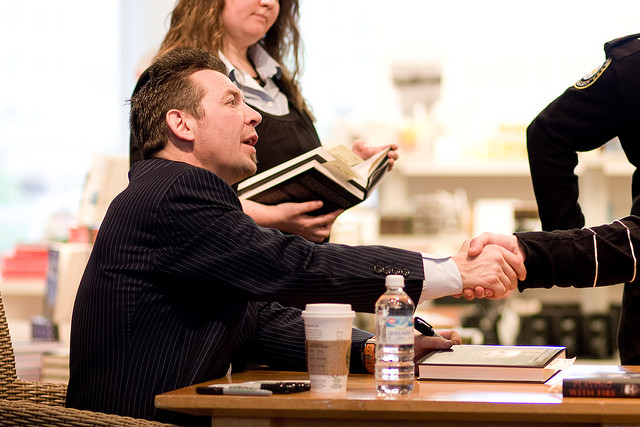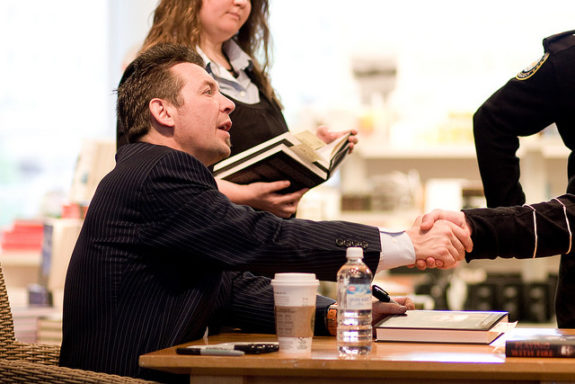
The NHL has changed a fair bit since Theoren Fleury last laced up skates and even more so since he first donned a Calgary Flames sweater. Best known for his small size and large personality, he was an anomaly during his playing days. In an era that featured some of the biggest names and also some of the toughest customers in the history of the game, the undersized Fleury managed a successful career.
It wasn’t until he hung up his skates for good that revelations came to light about what truly fueled the Flames legend. It is through these revelations that Fleury now champions multiple initiatives to help victims of addiction, abuse and childhood trauma.
Forged in Fire
Theoren Fleury #14 of the Calgary Flames (Mandatory Credit: Ian Tomlinson /Allsport)
At 5-foot-6 and 182 pounds, Fleury was bluntly told he was too small to play pro, yet he clawed his way into the NHL with his skill and relentless determination. Drafted by Calgary in 1987, Fleury spent 11 seasons with the Flames, from 1988-1999, captaining the club for two seasons (1995-1997).
He recorded 34 points in 36 games during his rookie campaign in 1988-89 and hoisted the Stanley Cup at the end of that season. He remains the second highest scorer in franchise history, with 830 points (364 goals, 466 assists) in 791 career games.
“I was able to play 1,000 games and play in a ton of great games in history,” Fleury recalled while attending a recent Junior hockey event on Oct. 12, 2018. “Going to Calgary to be a part of that Calgary-Edmonton rivalry, was pretty amazing.”
Fleury eventually moved on from Calgary to join the Colorado Avalanche at the tail end of the 1998-99 season, where he appeared in 15 games. The next three seasons were spent under the bright lights of Broadway, as Fleury entered into the twilight of his professional hockey career. He tallied 69 goals and 132 assists in 224 games with the New York Rangers from 1999-2002.
His final year with the Rangers also featured an Olympic appearance in Salt Lake City, Utah. As a member of Canada’s elite national team, built by Wayne Gretzky, an emotional Fleury stood front and center as the country captured it’s first gold medal in men’s hockey since 1952.
This day 2002: Joe Sakic’s 2G 2A (b/w @TheoFleury14 & Mario Lemieux) lift Canada to Salt Lake Olympic gold over USA pic.twitter.com/QsMwBEJ4wC
— Dave Stubbs (@Dave_Stubbs) February 24, 2016
When the NHL’s crackdown on obstruction was announced in 2002, the league slowly transitioned from a more lenient attitude towards interference, hooking, holding, clutching and grabbing. The changes soon ushered in a surge of smaller sized, fleet-footed, skilled players who thrived under the new system.
The Good Ol’ Days
In 2018, Flames fans cheer on Johnny Gaudreau, but before ‘Johnny Hockey’, there was ‘Theo’.
Without the type of ‘told-ya-so’ trailblazing that Fleury prompted throughout his career, we may not have seen the evolution of hockey to where it is today, with the dazzling display of skill from Gaudreau, Patrick Kane, or Brad Marchand. When asked about the era of hockey he played in and whether he would have appreciated some of the rule changes that benefit smaller players in today’s game, Fleury was quick to defend the good ol’ days.
“I loved the era that I played in,” Fleury said. “I think the greatest collection of superstars played in our era. It was amazing. I got a chance to play with Gretzky and Messier and Lemieux; Sakic and Yzerman and all those guys. I played against them and played with them. I was very, very satisfied with my career. I don’t think I could have done much more than what I did, especially for a guy who was told he wasn’t going to play one game in the NHL because I was too small.”
Unfortunately, Fleury’s NHL career came to an unceremonious end. He was playing for the Chicago Blackhawks in 2002-03 when recurring issues with substance abuse and alcoholism led to his ‘indefinite suspension’ from the league after 54 games with the Blackhawks. Six years later, Fleury staged an exciting, albeit brief, comeback appearance with the Calgary Flames during the 2008-09 preseason, but officially retired following the tryout.
NHL rule changes enabled the rise of smaller, skilled players in today’s game and it’s worth noting that while the league has evolved over time, so too has Fleury.
A New Chapter
In 2009, Fleury released a biography titled Playing With Fire which shared a candid look into his tumultuous life of success and excess during his 16-year hockey career. The book was co-written by Kirstie McLellan Day and quickly became a bestseller. Not only did the book paint the picture of a day in the life of an NHL star, but it also revealed the trauma the kid from Oxbow, SK suffered as a child and the resulting addiction and substance abuse issues that followed him throughout his career.
It was a time of topsy-turvy emotions throughout the writing, editing, and publishing of such an intimate account. But the process became almost therapeutic for Fleury, who revealed more and more about his life, recording the details of his past into the pages of the book. When he initially met with McLellan Day about co-authoring his biography, the goal was to focus on Fleury the hockey player, and nothing else.
“We started writing Playing with Fire with the full intention of only talking about my hockey career, that’s it,” Fleury explained. “Early on in the process she made me feel safe and I trusted her. Three years later, I’m finished this book and I didn’t leave anything out, right? So four days before I’m going to Toronto, I’m scared, I’m freaking out because I don’t know how everyone is going to react to what’s in this book.”

Fleury’s books have helped others and their loved ones. (Flickr/Pixeloflight)
Fleury’s expectations weren’t high when he sat down for his first book signing to promote his newly released biography at the biggest Indigo Chapters store in Canada. However, his story was widely acclaimed by those inside the hockey world and those outside it. It was during this book signing that a disheveled man standing in solitude amongst the crowd caught Fleury’s attention. When the man arrived at the signing table, he placed the copy of the book he had been clutching down on the table, looked up and said: ‘me too.’
It was a searing moment for Fleury, who remembers the moment vividly.
“That’s when my life changed. I realized, wow, by me finding my own voice and talking about my experience I can help other people find their voices too,” Fleury recalled. “I would have never thought that my post-hockey career would be (as) an advocate for people who have experienced trauma or suffer with mental health and addiction problems, but I can tell you, this is what I was meant to do.”
Fleury’s journey continues with multiple programs created to help raise awareness and support victims of childhood trauma. One of those initiatives annually walks across select Canadian provinces to help spread a message of hope.
Blazing A Trail
He’s a hockey player, an author, a singer/songwriter and now an activist. Theo Fleury is actively involved in developing ways to help those who have suffered traumatic childhood experiences. As a public speaker, he makes appearances on television and radio, at schools and local events across Canada offering a message of hope for recovery.
The goal is to create awareness and share the necessary information with those who desperately need it. Powered by an Orange Wave of Courage, a movement has been started across the country to lift the stigmas about childhood trauma, mental health and addiction.
Theo Fleury’s Victor Walk – In Talks With The Documentary’s Director https://t.co/aFbZdBLPlb # via @HuffPostMedia #VictorWalk #Documentary
— Victor Walk Doc (@VictorWalkDoc) July 17, 2017
The Victor Walk and its accompanying documentary are just two of the initiatives Fleury spearheaded in 2013 to help spread the word.
“I wanted to do something bigger, something to raise awareness, but I wanted it to be a grass-roots movement and that’s how we created the Victor Walk,” Fleury explained. “I got seven of my buddies together, we rented two Winnebagos and in 2013 we walked from Toronto to Ottawa. So, four hundred kilometers over a 10 day period and it really changed my life and really gave me perspective and inspired me.”
In its fifth year, the July 2018 edition of the Victor Walk strolled confidently through Alberta, Canada, with participants stopping in Fort McMurray, Lac Labiche, Cold Lake, Drumheller, Medicine Hat and Calgary. It was reportedly the most well-attended walk to-date.
Breaking Free
The Breaking Free Foundation, which facilitates the Victor Walk, is an online initiative founded by Fleury to help support the survivors of abuse. It offers a grant program which makes therapy affordable and accessible to those who need it, as well as a Meet Up initiative that encourages people to speak up, providing a safe place for them to tell their stories.
“With my story, I shouldn’t be here,” Fleury confesses. “I should have been gone a long time ago. But somehow, some way, there was a bigger plan and so I feel very blessed and very fortunate to be able to do the work that I do now and help people and just help them understand trauma and help them move towards a path of healing and recovery.”
Tomorrow @drumdragons are hosting Victor Night in support of the Breaking Free Foundation! Thank you #Drumheller! https://t.co/saNGjhtdjY @TheoFleury14 pic.twitter.com/brlkxgib4V
— BreakingFreeFDN (@BreakingFreeFdn) October 11, 2018
The Meet Up program is credited with saving multiple lives and continues to inspire Fleury and his team to build on what they’ve started.
Fleury played 1,084 games in the NHL, scoring 1,088 points (455 goals and 633 assists) and added 1,840 penalty minutes. He is 64th in all-time scoring in the NHL, as well as a Stanley Cup champion and an Olympic gold medalist. But his most important accomplishments have to do with the people whose lives are being transformed by his story.
Be the first to comment